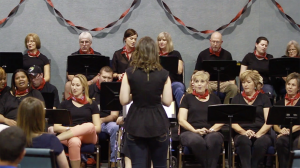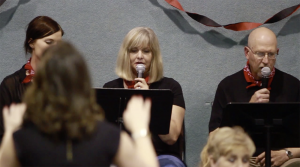TTUHSC ‘STARs’ Perform Annual Aphasia Concert
The School of Allied Health Sciences Showcases Music and Art in Aphasia Therapy

It was standing room only at Quaker Avenue Church of Christ as audience members held bouquets of roses for the performers, vocal warm ups resounded from the stage and people searched in vain for a seat. The enthusiasm and crowd might have belonged to any talented performance group, but this group, all with festive red bandanas and matching black shirts, was incredibly special. The choir is mainly made up of survivors of stroke or traumatic brain injury resulting in a condition called aphasia, an acquired communication impairment that affects a person’s ability to express him or herself in speech or writing or understand the speech and writing of others.
“We are the Aphasia Choir,” said one of the choir members. “Aphasia affects a person’s ability to speak and understand language. Aphasia is a loss of words, not a loss of intelligence.”
The Stroke/Aphasia Recovery (STAR) Program at the Texas Tech University Health Sciences Center (TTUHSC) School of Allied Health Sciences Department of Speech, Language and Hearing Sciences hosts an annual two-week arts therapy program each summer that culminates in the Aphasia Choir Concert and Art Show. Interestingly, many people with aphasia are still able to sing, and the aphasia choir offers an appreciated means of expression when other communication avenues are vexed.
“Singing involves the right hemisphere of the brain, which is typically not damaged with aphasia,” said Melinda Corwin, Ph.D., CCC-SLP, professor and director of the STAR Program at the TTUHSC Department of Speech, Language and Hearing Sciences. “Speaking involves the left hemisphere of the brain, which is damaged in cases of aphasia.”
During the camp, familiar songs are rehearsed with diligence and precision, as is each song’s introduction, which STAR program members also deliver themselves. The performance not only brings joy to the choir members, their families and the attending community, but also opens a conversation and increases awareness about aphasia. Corwin believes this is critically important because while the condition affects more people than Parkinson’s disease, few have even heard of it.
“We purposely hold our aphasia arts camp with the concert and art exhibit in June,
which is Aphasia Awareness Month,” Corwin said.

The choir is not only a fun opportunity to socialize and perform, but also a great form of therapy for individuals with aphasia. Music, melody and rhythm, alongside other therapy, can actually improve the condition.
“Some people with aphasia may only be able to say five words in an hour, but they can come here and sing all the words to a song because they’re using a different part of their brain,” said Brenna Price, STAR Program Aphasia Choir director. “It’s a chance to get them to communicate, which is so important.”
Price also says that the concert and exhibit play a role in encouraging STAR participants
in their hard work and rebuilding confidence, which is sometimes lost with the ability
to speak.
“All individuals appreciate being recognized for their hard work and dedication,”
Price said. “Whether in aphasia choirs or not, the performance is the culmination
of rehearsals for most choirs.”
The STAR summer camp participants also created a variety of visual art. After the concert, audience members were invited to enjoy a reception and showing of art pieces including paintings, drawings, photography and water color works. The annual gallery offers STAR program participants the opportunity to express their minds and hearts and convey their emotions, which is a challenge after the onset of aphasia.
“The art exhibit provides opportunities for friends and families of the stroke survivors to see how competent the stroke survivors are,” said Sarah Taylor, STAR Program art director. “It is also an opportunity to educate the general public about aphasia and the fact that it affects language but not intelligence or artistic ability.”
The program not only cultivates what may have been previously unrecognized talents in participants with aphasia, but it also gives members with aphasia the opportunity to return to these activities in a therapeutic setting.
“Creative and artistic abilities are often preserved in individuals with aphasia,” Taylor said. “The arts program allows individuals to express themselves through multiple art forms, and everyone appreciates having their talent recognized.”
Members of the program, instructors and volunteers stayed after the concert to welcome family and show their artwork. Some look forward to the program all year, and their smiles revealed how proud they were of the art presentation and concert. For these performers, the evening offered a profound revelation that despite aphasia, their voice and creativity would not be silenced.
Click here to watch the video >>
Related Stories
How Does Your Garden Grow?
As spring approaches, some people’s thoughts turn to gardening. Whether it’s a flower garden they desire or a vegetable garden want to have, they begin planning what they’ll plant and what they need to do to ensure a successful garden.
Adopt a Growth Mindset for a Better Life
A “growth mindset” accepts that our intelligence and talents can develop over time, and a person with that mindset understands that intelligence and talents can improve through effort and learning.
Drug Use, Family History Can Lead to Heart Disease in Younger Adults
Abstaining from drug abuse and an early diagnosis of familial hypercholesterolemia (high cholesterol) can help prevent heart disease.
Recent Stories
The TTUHSC Laura W. Bush Institute for Women’s Health Welcomes Ben Carson as Power of the Purse Keynote Speaker
Retired neurosurgeon and former U.S. Secretary of Housing and Urban Development Ben Carson, M.D., delivered a keynote address at the Power of the Purse luncheon and fundraiser today (April 18).
Filling the Gap: PA Impact on Rural Health Care
Assistant Professor and Director of Clinical Education Elesea Villegas, MPAS, PA-C, spoke about the challenges rural health care currently faces and how PAs are stepping up to better serve the rural patient population.
School of Pharmacy Remembers Contributions of Key Collaborator
Cynthia Nash, Pharm.D., served as an Adjunct Assistant Professor of Pharmacy Practice for the School, and was an instrumental collaborator and key ally in our partnership with the Dallas VA North Texas Health Care System.
